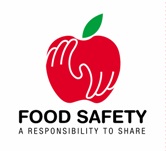Saturday, August 25, 2012
Did Our Refrigerators Evolve to Favour Bacteria?
This visit gave me an opportunity to spend a whole day at the Culinary Museum at the Johnson and Wales University in Providence. There were several old food equipment in the museum, most of them look so different from the ones that we see now. They have transformed into user friendly and energy saving versions and have become much more affordable. I found the interiors of the refrigerator particularly interesting.
We spend a lot of time educating public on how to segregate raw meat from ready to eat foods. Where did the covered meat trays and the labels go?
The stuffed up refrigerators used at home prevents air circulation and increases the probability of bacteria spreading from raw food to cooked food, right?
Wednesday, November 10, 2010
Monday, November 1, 2010
Barbecue and Food Safety
Food Safety Issues
- Always wash your hands after handing raw meat.
- Use separate utensils for cooked and raw meat.
- Don't put cooked food on a plate or surface that's been used for raw meat.
- Don't put raw meat next to cooked or partially cooked meat on the barbecue.
- Keep raw meat away from ready-to-eat foods.
- If a marinade or sauce has been used with raw meat, don't then add it to cooked food.
- Ensure frozen food is thoroughly thawed before you cook it.
- Don't start cooking until the charcoal is red hot, with a grey powdery surface.
- Cook food evenly, by turning it regularly and moving it around on the barbecue.
- Make sure the centre of food is piping hot and cooked right through.
- Don't make the mistake of assuming food must be cooked right through if it's charred on the outside, as this isn't always the case.
Saturday, October 9, 2010
How to MAKE news
Monday, December 21, 2009
Saturday, October 31, 2009
Harmless Bacteria as a Natural Weapon Against Disease Causing Bacteria
It would be interesting to see how this works in the field.
Wednesday, September 30, 2009
Adulteration of Milk in India – What is the Government Doing About It?
In September 2008, several thousand babies in
Let us now look at what is happening in
1. THIRUVANANTHAPURAM, MARCH 9. The Centre of Indian Consumer Protection and Research (Coinpar), a consumer rights organisation in the city, which tested eight brands of milk available in the market and also milk sold by cycle vendors, has reported the presence of the chemical, formalin, in three samples.
2.
3. PUNE, Sept 18. The Pune rural police busted a milk adulteration racket in Patas near Duand, about 50 km from the city, in the wee hours of Thursday by arresting a gang of six suspects. According to the police, the gang used to mix lactose powder and caustic soda in the milk to raise the degree and fat contents of the milk at a dairy named as L V Dairy. The police have also seized two tanker containing around 17,000 litre of milk, three gunny bags of lactose powder, five gunny bag containing caustic soda and five bags of the milk powder totalling to Rs 93.59 lakh.

4.
The contamination of this sort is not just limited to milk, the chemicals reach all products that use this milk including yoghurt, sweets, cheese, ghee, butter and baby food. Regardless of crushing business pressure, there is no excuse for the adulteration of food in this way. Diluting a product with water, the old approach, is highly unethical and can lead to malnutrition, but addition of formalin can cause a number of detrimental effects .
There is no reason to imagine that we come to know about all cases of adulteration and to believe that people behind these cases are punished. Such issues seem to be of least concern to the Indian government that is struggling to sort out the food shortage issues.
Consumer Advisory : Buy milk from a trusted source. Even if you pay a little more, go for reputed brands. Your neighbour’s cow is always a better choice if you can keep an eye on what is happening after the milking process!


